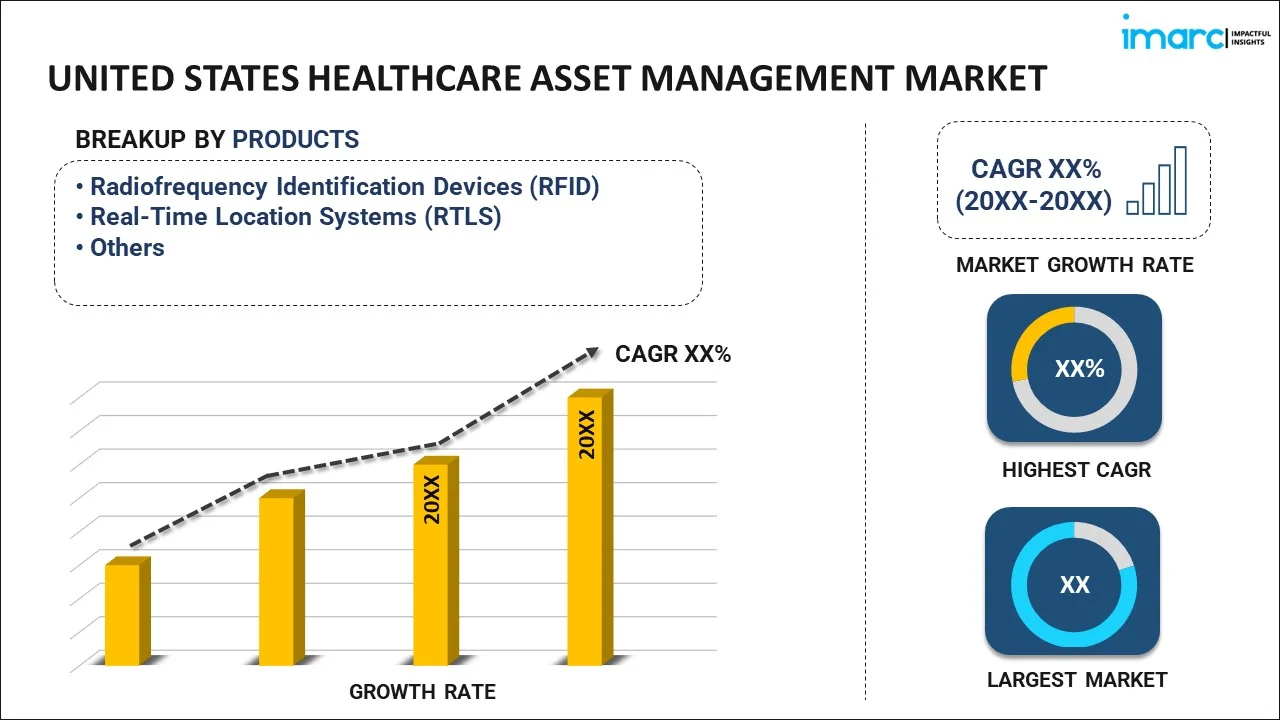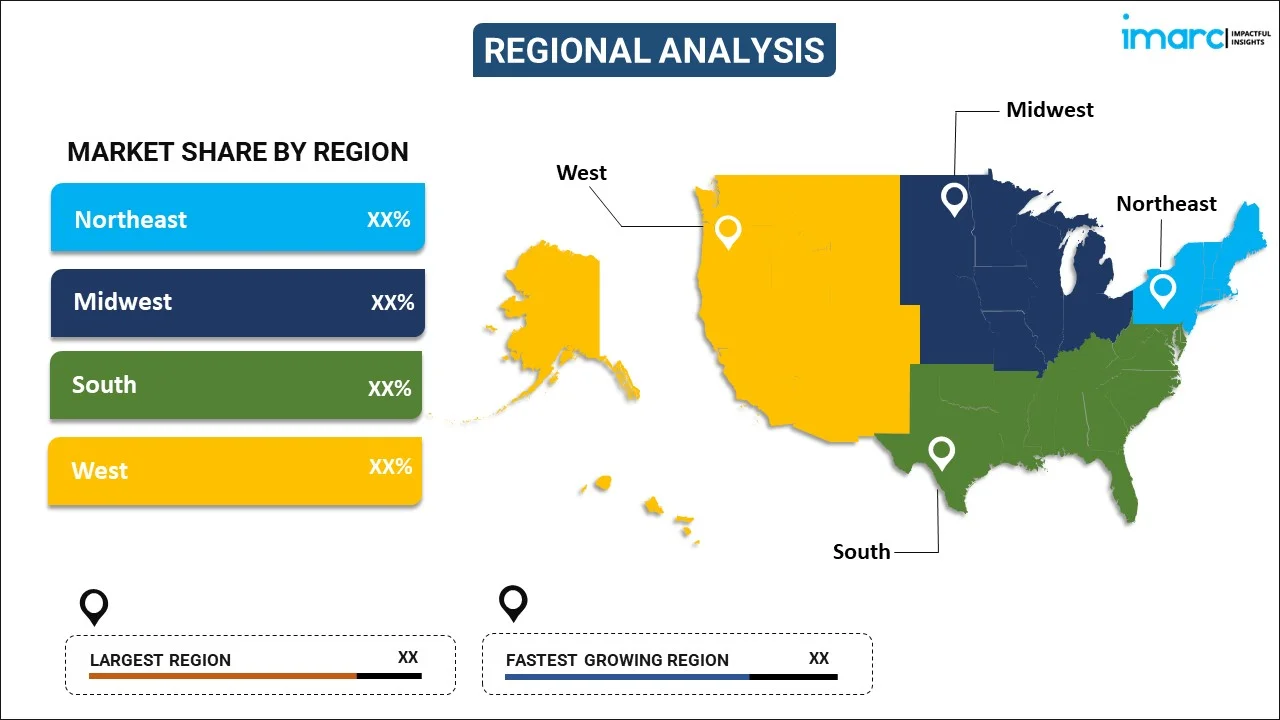
United States Healthcare Asset Management Market Report by Product (Radiofrequency Identification Devices (RFID), Real-Time Location Systems (RTLS), and Others), Application (Hospital Asset Management, Pharmaceutical Asset Management), End User (Hospitals and Clinics, Laboratories, Pharmaceutical Companies, and Others), and Region 2025-2033
Market Overview:
United States healthcare asset management market size reached USD 12.2 Billion in 2024. Looking forward, IMARC Group expects the market to reach USD 125.1 Billion by 2033, exhibiting a growth rate (CAGR) of 29.1% during 2025-2033. The increasing demand for efficient healthcare services, which has led to a focus on optimizing operations in primary healthcare facilities, is driving the United States healthcare asset management market share.
|
Report Attribute
|
Key Statistics
|
|---|---|
|
Base Year
|
2024 |
|
Forecast Years
|
2025-2033
|
|
Historical Years
|
2019-2024
|
| Market Size in 2024 | USD 12.2 Billion |
| Market Forecast in 2033 | USD 125.1 Billion |
| Market Growth Rate (2025-2033) | 29.1% |
United States Healthcare Asset Management Analysis:
- Major Drivers: Adoption of advanced technology such as Internet of Things (IoT) devices and RFID systems facilitates effective tracking and management of assets. Rising need for cost-saving solutions to lower operational costs fuels investment in asset management systems. Enhanced focus on patient safety and compliance with regulations requires real-time monitoring of medical equipment and materials.
- Major Market Trends: Increasing adoption of artificial intelligence (AI) with RTLS technologies for efficient workflows and employee safety thus aiding the United States healthcare asset management market growth. More and more healthcare facilities embracing ultra-wideband and Bluetooth low-energy technologies for higher tracking accuracy. Increased use of predictive analytics in asset management for preventive maintenance scheduling.
- Market Challenges: High upfront costs of implementation and complicated integration with legacy healthcare systems are challenging. Training staff needs and organizational resistance to technology adoption result in operational hurdles. Data security and patient privacy while retaining connectivity are ongoing issues.
- Market Opportunities: Based on the United States healthcare asset management market analysis, the pharmaceutical supply chain management and drug anti-counterfeiting expanding applications provide opportunities for growth. Cloud development provides scalable and economical deployment. Integration with electronic health records provides rich patient care ecosystems.
Healthcare asset management involves the systematic tracking and optimization of medical equipment, devices, and supplies within a healthcare facility. It employs technologies such as RFID, barcoding, and IoT to monitor the location, usage, and maintenance status of assets. This ensures efficient resource utilization, reduces operational costs, and enhances patient care by preventing equipment shortages or delays. The system enables healthcare providers to streamline inventory management, track equipment lifecycles, and ensure regulatory compliance. Additionally, it aids in preventive maintenance scheduling, reducing downtime, and improving overall equipment performance. Healthcare asset management plays a crucial role in enhancing operational efficiency, minimizing losses, and ultimately contributing to a more effective and reliable healthcare environment.
United States Healthcare Asset Management Market Trends:
Integration of Artificial Intelligence and Machine Learning
The healthcare asset management industry is experiencing unparalleled convergence of AI and ML technologies to increase operational effectiveness. These next-generation algorithms review past usage patterns, predict equipment breakdowns, and streamline maintenance schedules. AI-based systems yield real-time visibility into asset utilization rates, allowing healthcare facilities to make informed decisions on resource allocation. Machine learning algorithms continuously enhance tracking accuracy and decrease false alarms, leading to improved staff productivity. Healthcare organizations use AI to automate inventory replenishment, forecast demand variations, and optimize procurement procedures. This integration allows for predictive maintenance strategies that reduce equipment downtime and maximize asset longevity. The integration also supports smart routing of mobile assets and staff, optimizing workflow efficiency between departments. Advanced analytics capabilities deliver enriched dashboards for executive decision-making and strategic planning. These computer-based solutions help realize substantial cost savings as well as enhance the quality of patient care through improved equipment availability and reliability.
Cloud-Based Asset Management Solutions
Cloud computing has transformed healthcare asset management through scalable, affordable, and accessible solutions. Healthcare facilities increasingly use cloud-based systems to consolidate asset data from various locations and departments. The solutions provide the elimination of high on-premises hardware costs and free automatic software updates and advanced security features. Cloud platforms support real-time collaboration among various stakeholders, such as biomedical engineers, procurement groups, and clinical staff. The scalability of cloud solutions enables healthcare organizations to adapt asset management functionality to evolving needs and United States healthcare asset management market demand. Remote access ensures that appropriate personnel can control and monitor assets from wherever they are, promoting distributed healthcare networks. Cloud-based systems provide effective backup and disaster recovery, ensuring business continuity in case of crises. Integration into electronic health records and hospital information systems becomes effortless through cloud APIs. Health care organizations are advantaged with minimal IT infrastructure expenses and increased system reliability by virtue of professional cloud services.
Enhanced Cybersecurity and Data Protection
With healthcare asset management systems becoming more and more networked and digitized, cybersecurity has become a top priority. Healthcare organizations have multi-tiered security measures in place to safeguard sensitive asset information and patient data against cyber attacks. Next-generation encryption solutions protect data transmission among RFID tags, sensors, and central management systems. Zero-trust security models guarantee that only certified persons can access important asset management operations and information. Healthcare organizations implement intrusion detection systems and real-time monitoring tools to detect possible security vulnerabilities in real time. Periodic security audits and vulnerability scanning enable strong protection from emerging cyber threats. HIPAA and other regulations push implementation of end-to-end data governance policy. Biometric authentication and multi-factor authentication systems are used to strengthen access control into asset management portals. Training programs for staff concentrate on cybersecurity best practices and awareness as well as how best to manage sensitive asset and patient information. These security measures enhance stakeholder trust and compliance with regulation while safeguarding organizational reputation.
United States Healthcare Asset Management Market Segmentation:
IMARC Group provides an analysis of the key trends in each segment of the market, along with forecasts at the country level for 2025-2033. Our report has categorized the market based on product, application, and end user.
Product Insights:

To get more information on this market, Request Sample
- Radiofrequency Identification Devices (RFID)
- Real-Time Location Systems (RTLS)
- Others
The report has provided a detailed breakup and analysis of the market based on the product. This includes radiofrequency identification devices (RFID), real-time location systems (RTLS), and others.
Application Insights:
- Hospital Asset Management
- Staff Management
- Equipment Tracking and Management
- Patient Management
- Others
- Pharmaceutical Asset Management
- Drug Anti-counterfeiting
- Supply Chain Management
A detailed breakup and analysis of the market based on the application have also been provided in the report. This includes hospital asset management (staff management, equipment tracking and management, patient management, and others) and pharmaceutical asset management (drug anti-counterfeiting and supply chain management).
End User Insights:
- Hospitals and Clinics
- Laboratories
- Pharmaceutical Companies
- Others
The report has provided a detailed breakup and analysis of the market based on the end user. This includes hospitals and clinics, laboratories, pharmaceutical companies, and others.
Regional Insights:

- Northeast
- Midwest
- South
- West
The report has also provided a comprehensive analysis of all the major regional markets, which include Northeast, Midwest, South, and West.
Competitive Landscape:
The market research report has also provided a comprehensive analysis of the competitive landscape. Competitive analysis such as market structure, key player positioning, top winning strategies, competitive dashboard, and company evaluation quadrant has been covered in the report. Also, detailed profiles of all major companies have been provided.
Recent News and Development:
- In June 2025, Macquarie Asset Management launched Health Wave Partners, a senior housing investment platform targeting modern assets and partnerships with established operators. Led by a team with 75+ years of sector experience and $50 billion in healthcare real estate transactions, the platform aims to leverage Macquarie’s expertise to capitalize on growing demand amid U.S. senior housing undersupply. The strategy focuses on high-quality properties in strong demographic and economic regions to deliver attractive risk-adjusted returns.
- In April 2025, Ares Commercial Finance launched a Healthcare-focused Asset Based Lending (ABL) platform to expand its middle-market financing capabilities. Led by industry veterans Todd Gordon, Dan Berger, and Nathan Brenneman, the platform aims to provide flexible, customized credit solutions to healthcare companies, including hospitals and skilled nursing facilities. Leveraging Ares’ broad resources and direct lending expertise, the initiative targets refinancing, growth, acquisitions, and restructuring needs within the dynamic U.S. healthcare sector.
United States Healthcare Asset Management Market Report Coverage:
| Report Features | Details |
|---|---|
| Base Year of the Analysis | 2024 |
| Historical Period | 2019-2024 |
| Forecast Period | 2025-2033 |
| Units | Billion USD |
| Scope of the Report | Exploration of Historical and Forecast Trends, Industry Catalysts and Challenges, Segment-Wise Historical and Predictive Market Assessment:
|
| Products Covered | Radiofrequency Identification Devices (RFID), Real-Time Location Systems (RTLS), Others |
| Applications Covered |
|
| End Users Covered | Hospitals and Clinics, Laboratories, Pharmaceutical Companies, Others |
| Regions Covered | Northeast, Midwest, South, West |
| Customization Scope | 10% Free Customization |
| Post-Sale Analyst Support | 10-12 Weeks |
| Delivery Format | PDF and Excel through Email (We can also provide the editable version of the report in PPT/Word format on special request) |
Key Benefits for Stakeholders:
- IMARC’s industry report offers a comprehensive quantitative analysis of various market segments, historical and current market trends, market forecasts, and dynamics of the United States healthcare asset management market from 2019-2033.
- The research report provides the latest information on the market drivers, challenges, and opportunities in the United States healthcare asset management market.
- Porter's five forces analysis assist stakeholders in assessing the impact of new entrants, competitive rivalry, supplier power, buyer power, and the threat of substitution. It helps stakeholders to analyze the level of competition within the United States healthcare asset management industry and its attractiveness.
- Competitive landscape allows stakeholders to understand their competitive environment and provides an insight into the current positions of key players in the market.
Key Questions Answered in This Report
The healthcare asset management market in the United States was valued at USD 12.2 Billion in 2024.
The United States healthcare asset management market is projected to exhibit a CAGR of 29.1% during 2025-2033, reaching a value of USD 125.1 Billion by 2033.
The United States healthcare asset management market is driven by the rising need for efficient resource utilization, reduction of operational costs, and improved patient care. Growing adoption of advanced technologies, such as RFID and IoT, for real-time tracking and compliance with regulatory standards further propel market expansion in healthcare facilities.
Need more help?
- Speak to our experienced analysts for insights on the current market scenarios.
- Include additional segments and countries to customize the report as per your requirement.
- Gain an unparalleled competitive advantage in your domain by understanding how to utilize the report and positively impacting your operations and revenue.
- For further assistance, please connect with our analysts.
 Request Customization
Request Customization
 Speak to an Analyst
Speak to an Analyst
 Request Brochure
Request Brochure
 Inquire Before Buying
Inquire Before Buying




.webp)




.webp)












